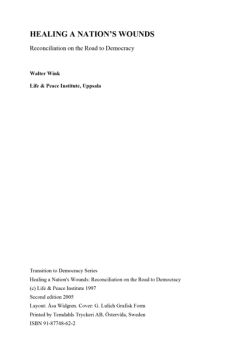Publications & reports
Healing a Nation's Wounds
Reconciliation on the Road to Democracy

- Date
- Type
- Report
- Author
- Walter Wink
Summary
Foreword to 2005 edition
When Healing a Nation's Wounds first appeared in 1997, it seemed as if forgiveness, apologies, and reconciliation had become the order of the day for newly-liberated nations or peoples. South Africa was exemplary. It switched from being the epitome of oppression to becoming the very model of political transition. Its Truth and Reconciliation Commission demonstrated the practicality of religious practices like confession, repentance, reparations, penance, and restitution. There, and elsewhere, the degree of nonviolence employed in the struggle proved to be the best gauge of the degree of reconciliation possible.
The role-call of states that have undergone nonviolent revolutions is staggering. The world has never seen the likes of it. What had begun as isolated nonviolent events became long-term campaigns and wholesale political revolutions. Examples of such nonviolence would be the independence struggles against colonialism in India and Ghana, the collapse of the Union of Soviet Socialist Republics and its satellite states (Poland, East Germany, Hungary, Czechoslovakia, Bulgaria, Romania, Albania, Mongolia, Latvia, Lithuania, Estonia), and various other nonviolent struggles around the world (Benin, the Philippines, New Caledonia, Madagascar, Brazil, Argentina, Chile, and the largely nonviolent efforts in Chiapas and Nicaragua). Then there is the long tradition of nonviolence in the United States, from the abolition of slavery, to the suffragette movement to gain women the vote and political rights, the civil rights struggle, the anti-Vietnam war demonstrations, the campaign to disarm nuclear weapons, and the United Farm Workers. Nonviolence failed, at least in its short-term goals, only in China and in the opposition to the two Iraq Wars.
There has never been a time in all of human history that has witnessed such nonviolence on a national, and even international, scale. But the twenty-first century has thus far shown little indication of following suit. Instead we see U.S.-supported oligarchs in Haiti subverting the legitimately elected Aristide administration. Guatemalan peasants are being driven off their farms in a repetition of the state violence that ended in 1996 after 100,000 were killed and millions more rendered landless. Columbia has become the cocaine capital of the world, while U.S. "liberation" of Afghanistan has restored it as the world headquarters of the heroine trade. Africa has almost degenerated into a war-of-the-week. It appears that the lessons we learned about nonviolence in the last century have fallen on deaf ears.Nevertheless, when nations finally fall, they have to find ways to tell the truth about the atrocities committed, exhume the bodies of the disappeared, and pay whatever reparations are due, to whatever degree actually possible under the new regime. Reconciliation may seem impossible in some areas, such as the Sudan or Guatemala. And the Bush administration has created in Iraq a quagmire for which there may be no healing for decades, perhaps even centuries. Even in the worst-case scenarios, however, there can be no healing without the truth, no forgiveness without the facts, and no reconciliation without repentance. But the very fact that nations must now deal with "truth and reconciliation" is an enormous step forward in the maturing of regimes that once acted with impunity.
November 2004 Walter Wink Professor of Biblical Interpretation Auburn Theological Seminary New York City, USA